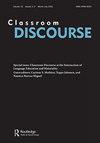Towards a shared vision of language, language learning, and a school project in emergence
IF 1.6
Q2 EDUCATION & EDUCATIONAL RESEARCH
引用次数: 4
Abstract
ABSTRACT Technology development allows new ways of communication, learning and collaboration. This is reflected in the professional scenarios of language teaching. Modern curricula value participants’ interest and meaningful (inter)action as a basis for learning. Sensitivity is important in anticipating participants’ changing needs in modern learning environments, characterised by linguistic and technological hybridity, as well as novel pedagogical approaches. Language students, more familiar with teaching in the traditional classroom, need to appropriate new practices to orchestrate learning in settings requiring multiple activities simultaneously. This study explores how language students learn to manage complex pedagogical situations during a university course in which they create an online project for school children. During online chat sessions administered for the school pupils, the university lecturer’s office was an important site for negotiating and acting on pedagogical issues as well as practical matters arising from the work at hand. Nexus analysis was used as a research approach. Primary research materials include video recordings from the university lecturer’s office, chatlogs and reflection papers from students. The study is relevant for reconceptualising the changing roles of (language) teachers and provides new perspectives for language teacher education in a technology-rich world.对语言、语言学习和学校项目的共同愿景
技术的发展为交流、学习和协作提供了新的途径。这体现在语言教学的专业场景中。现代课程重视参与者的兴趣和有意义的(相互)行动作为学习的基础。在以语言和技术混杂为特征的现代学习环境以及新颖的教学方法中,敏感性对于预测参与者不断变化的需求非常重要。语言专业的学生更熟悉传统课堂教学,他们需要适当的新实践,在需要同时进行多种活动的环境中协调学习。这项研究探讨了语言学生如何在大学课程中学习管理复杂的教学情况,他们为在校儿童创建了一个在线项目。在为学生管理的在线聊天课程中,大学讲师的办公室是一个重要的场所,可以就教学问题以及手头工作中出现的实际问题进行谈判和采取行动。采用Nexus分析法作为研究方法。主要的研究资料包括大学讲师办公室的录像、学生的聊天记录和反思论文。这项研究与重新定义(语言)教师不断变化的角色有关,并为技术丰富的世界中的语言教师教育提供了新的视角。
本文章由计算机程序翻译,如有差异,请以英文原文为准。
求助全文
约1分钟内获得全文
求助全文

 求助内容:
求助内容: 应助结果提醒方式:
应助结果提醒方式:


